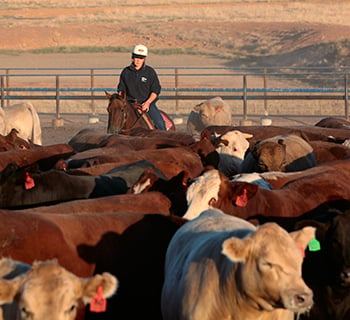Assessment & Certification
Protecting animal welfare and increasing sustainability
Assessment
We regularly assess our operations to ensure sustainability, humane animal handling, employee safety and food safety [link to food safety content elsewhere on Cargill.com] best practices are being followed. These reviews reinforce standards, identify areas for improvement and increase transparency.
Animal welfare
Animal welfare is an essential component of how we operate our plants and other company-owned facilities. Our assessment processes include:
- Independent audits: We conduct annual third-party animal welfare audits and strictly adhere to North American Meat Institute (NAMI) and National Cattlemen’s Beef Association’s (NCBA) Beef Quality Assurance (BQA) animal handling standards.
- Remote video auditing: We pioneered the use of third-party remote video auditing (RVA) for animal welfare purposes at all Cargill beef plants.
Certification
We expect animals to be treated well throughout the beef supply chain, from producers, to transportation, to processing at a Cargill facility. Certification is one way we help ensure best practices are being followed.
Cattle producers: By 2018, Cargill will increase to 90 percent the BQA certified feed yards that supply cattle to our facilities. We are the first major beef processor to establish such a target. BQA is a stewardship certification program created by the NCBA, and includes training for cattle producers in best practices. We are working with the Canadian beef industry to create a similar program. We also worked with the NCBA and the National Milk Producers Federation (NMPF) to ensure that 90 percent of dairy cattle processed at Cargill beef facilities in the U.S. will be FARM certified (Farmers Assuring Responsible Management program) by 2019.

Transportation: Good animal husbandry is important in every step of the production process, including transportation of cattle. By 2019, more than 90 percent of our beef transporters will be Beef Transport Quality Assurance (BTQA) certified. The BTQA program was developed by veterinarians, animal scientists, educators and beef producers to improve animal welfare, create an identification and documentation system for information about cattle transporters, and increase accountability, transparency and compliance with animal welfare and food quality standards.
Animal handling: Our employees are trained and certified in safe animal handling best practices. Our team holds more certified personnel than any other North American beef processor, with 30-plus Professional Animal Auditor Certification Organization (PAACO)-certified auditors and more than 200 participants at the NAMI Animal Care and Handling Conference on staff.

